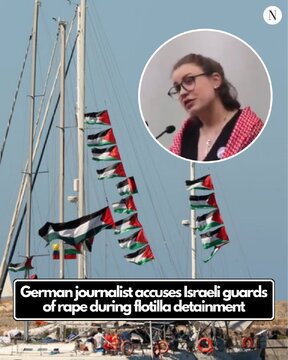AhlulBayt News Agency: With the beginning of the blessed month of Ramadhan and the harsh economic and social conditions resulting from the siege of Palestinians living in the Jenin camp in the West Bank, the Zionist regime's attacks on this camp and the destruction of Palestinian homes in the West Bank continue.
The Zionist regime's bulldozers have destroyed the main and secondary roads of the Jenin camp in the West Bank. According to Palestinian sources, approximately 40,000 Palestinians have been displaced following this assault.
A displaced Palestinian, in an interview with the al-Alam news network, said: "We are waiting to return to our homes. The Zionist enemy thinks it can break the will of the Palestinians through displacement, but they are mistaken. Despite the attacks by the Zionist regime, we want to live in our homeland. Jenin does not belong to them; it belongs to the Palestinians."
Meanwhile, the Zionist regime has continued its operations to destroy residential homes in the Nur Shams camp, located east of Tulkarm in the northern West Bank, since Saturday. The regime's bulldozers have demolished nearly 30 residential units within this camp.
Hamas condemns the attack on the West Bank
The Palestinian Islamic Resistance Movement, Hamas, condemned the destruction of Palestinian homes in the Nur Shams camp by the Zionist regime, describing it as a blatant violation of international law and a war crime. Hamas emphasized that the actions of the occupying regime's army coincide with documented statements by the leaders of the Zionist regime, including its prime minister and minister of war, indicating a planned program to displace Palestinians from the camps in the northern West Bank.
Iftar tables in Gaza amidst the ruins of war
In other news, Palestinians living in the Gaza Strip also gathered around Iftar tables on Saturday, the first day of the blessed month of Ramadhan, amidst the rubble of their destroyed homes and the unbearable pain of losing their loved ones. In the northern Gaza Strip, where all residential areas have been destroyed, Palestinians have taken refuge in tents lacking the most basic facilities and broke their fast with simple meals, mainly consisting of canned food.
The situation was not much different in the city of Khan Younis in the southern Gaza Strip, where thousands of displaced Palestinians were forced to have Iftar in tents amidst the suffering caused by shortages of water and food. Survivors of the genocidal war in Gaza distributed food to some of the needy, and young volunteers handed out dates and water to those fasting.
In the city of Rafah, in the southern Gaza Strip, and the Shuja'iyya neighborhood, a collective Iftar table was set up, and hundreds of Palestinians gathered amidst the rubble of their homes, which had been destroyed as a result of the genocidal war. Despite the destruction, the people of Gaza are striving to build a hopeful life, hanging lanterns on the walls of their ruined homes in an effort to bring a glimmer of hope amidst the devastation.
/129






Your Comment